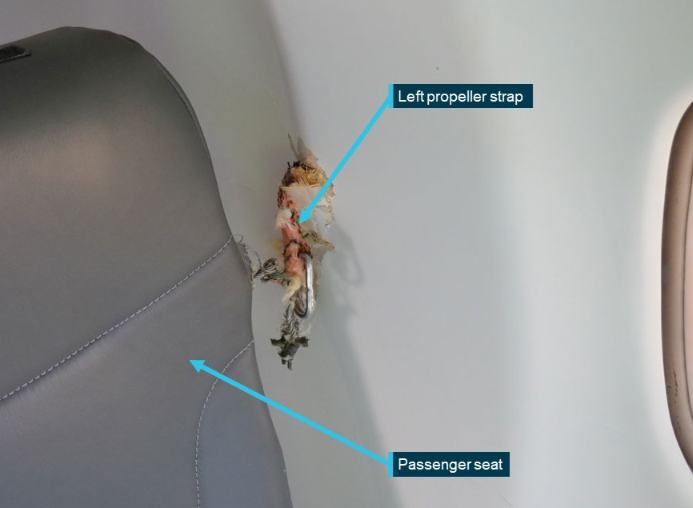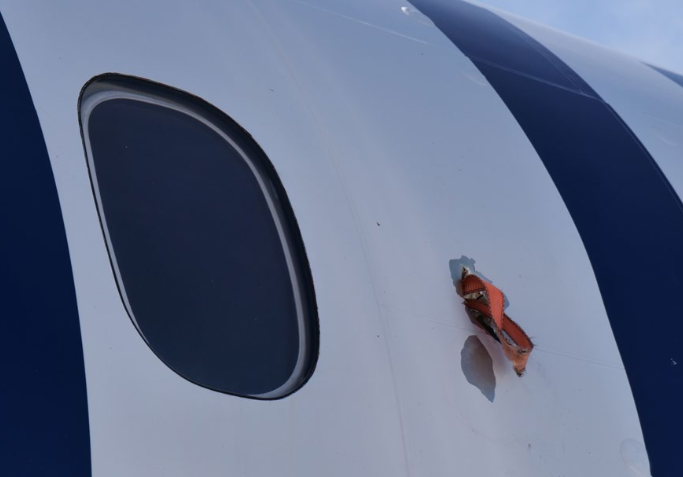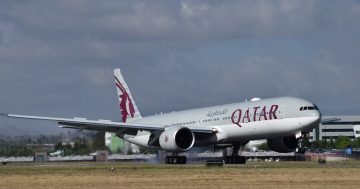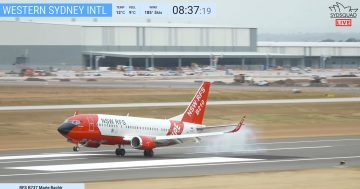
One person was injured when the propeller strap punctured the Canberra plane. Photo: ATSB.
There were several missed opportunities that would have prevented a terrifying takeoff from Canberra Airport, an aviation authority investigation has found.
A Link Airways flight from Canberra to Sydney was forced to land shortly after takeoff on 10 November 2022 when a propeller strap slid free of the blade and slammed into the fuselage.
Passengers reported hearing a loud bang and could see an object had penetrated the cabin wall.
A fragment struck a passenger, bruising their leg.
The Australian Transport Safety Bureau (ATSB) found “several factors” contributed to the propeller strap not being noticed or removed by several people – including the first officer, captain or dispatcher – before takeoff.
This included that an extension line for the strap, which is usually used to guide passengers onto the plane, wasn’t fitted from the strap to the airstairs.
“The strap extension does not allow the door to be closed while in place – and as such, would almost certainly have prevented the flight from proceeding with the propeller strap in place,” ATSB Chief Commissioner Angus Mitchell said.
It also did not have a high-visibility streamer fitted, which is required in the manufacturer’s design.
The front officer failed to remove the strap once passengers had boarded and final checks were done. The dispatcher didn’t conduct another walkaround of the aircraft, and the captain didn’t notice the strap.
During the plane’s start-up sequence, there was a delay between the engine starting and the propeller starting. This was because of the pins securing the strap to the engine cowling.
“Once these [pins] failed, the propeller began turning normally and the aircraft was cleared to depart with the strap still attached to the left propeller but not visible due to the propeller’s rotation,” the ATSB report noted.

There were several missed opportunities to see a strap was still attached to a propeller upon takeoff. Photo: ATSB.
The flight crew didn’t see or hear the propeller strap break through the plane’s wall, but the cabin manager did.
They waited until the aircraft was no longer in a “critical phase of flight” before letting the flight crew know there was “an emergency in the cabin”.
“[The cabin manager said] someone was hit, but did not elaborate beyond expressing a need to return to Canberra and that an ambulance would be required. The flight crew, believing the emergency to be only passenger-related, did not seek any additional information,” the report noted.
“Risk was increased by the flight crew not being informed of the fuselage penetration, although this did not contribute to the outcome of the occurrence.”
ATSB investigators reviewed CCTV footage from Canberra Airport, looking at eight separate flight preparations and dispatches involving Link Saab 340B planes in the days before this incident.
“The strap extension was not attached between the propeller strap and airstairs during boarding for two out of the eight observed departures, both of which were the first flight of the day,” the report noted.
“As the cabin door could not be closed with the strap extension in place, its correct fitment would almost certainly prevent a flight from proceeding with a propeller strap fitted.”
Link Airways inspected its Saab 340B fleet and found the condition of propeller straps to be “significantly variable.”
The ATSB also found that the ground handling company Swissport did not ensure that the dispatcher training and audits for operations involving Link Airways Saab 340 aircraft had all the elements required for pre-departure walkarounds in its ground handling manual.
“For those directly involved in aircraft operations, this occurrence should highlight the importance of vigilance,” Mr Mitchell said.
“The use of external ground handling services has become increasingly common in aviation, and the relationship between a carrier and a ground handler can add complexity to ground handling operations.
“When there are multiple risk controls in place and multiple responsible parties, it is easy to become complacent from an expectation that earlier checks have been done correctly and that future checks elsewhere in the system will likely catch anything missed.”
Since this incident, Link Airways has completed all recommendations made by the ATSB to improve safety.
Swissport has reiterated to all ramp staff that walkarounds are required for Saab aircraft.
Link Airways also plans audits of Swissport dispatchers to ensure procedures are properly implemented.
Original Article published by Claire Fenwicke on Riotact.




